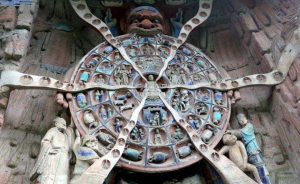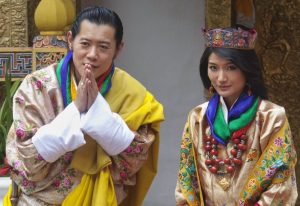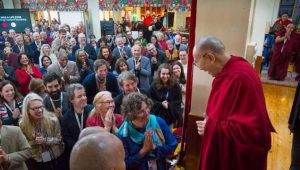
Venerable Samana Bhodirak, the founder and spiritual leader of the Santi Asoke Buddhist community in Thailand, has died. A message on social media posted by an organization representing Santi Asoke stated that Ven. Samana Bhodirak died early on Thursday morning of natural causes. He was 89 years old.
Santi Asoke (meaning “Peaceful Asoka”) is a Theravada Buddhist movement that has established a number of self-sustaining ascetic communities and monasteries across Thailand. The movement has also founded a series of social welfare projects, among them second-hand stores, farmer’s markets, and a restaurant that provides free meals to those in need.
According to media reports, Ven. Samana Bhodirak had been hospitalized with pneumonia in the northeastern province of Ubon Ratchathani before returning to Santi Asoke’s Ratchathani Asok Village in early February this year.
Born Mongkhon Rakphong in Thailand’s agrarian northeast in 1934, Ven. Samana Bhodirak carved out a well-established television career under the sobriquet Rak Rakphong, focused on educational and children’s programs before being ordained as a Buddhist monk in 1970, taking the Dhamma name Bodhirak. As a monk, Bhodirak was highly critical of contemporary monastic life, and publicly denounced other monks for eating meat, smoking cigarettes, and engaging in superstitious activities.
Ven. Samana Bhodirak established his own monastery in Nakhon Pathom Province, aiming to reflect the ideals of simplicity and self-sufficiency of the Thai Forest Tradition, and in 1975 declared independence for Santi Asoke from the Sangha Supreme Council of Thailand. Bodhirak subsequently adopted the Pali prefix samana, used to describe itinerant ascetics.
Santi Asoke members are strict vegetarians and live a simple life of abstinence, working to help people attain peace without suffering through Buddhist study and practice, and seeking to lead society back to the basics of the Buddhist teaching. Over a period of some three decades, the Santi Asoke Buddhist community has been lauded by members and by many observers as an example of the practical application of the Buddha’s teachings in the modern world—seeking to renounce greed, hatred, and delusion and to cultivate spiritual growth in a sustainable community that nurtures human life and the environment. Despite numerous obstacles and criticisms from the Buddhist establishment, Santi Asoke has sought to demonstrate that it is possible to live by cultivating wisdom and spiritual development in harmony with other living beings and with nature.

In response to the news, Prof. Sulak Sivaraksa, founder of the International Network of Engaged Buddhists (INEB), wrote an open message in memory of Ven. Samana Bhodirak, which was shared with BDG, and has been reproduced in translated and edited form below:
I would like to express my sincere condolences for the passing of Samana Bodhirak (formerly known as Rak Rakphong). He was once esteemed in the mass-media industry but later found it to be superficial. Instead, he turned to spirituality, initially interested in the rituals of Brahmanism, and ultimately found his calling in Buddhist monasticism. He sought ordination at Wat Asokaram under the Thammayut Nikaya.
He believed that the monastic sangha needed to modernize itself. However, he overlooked the fact that newly ordained monks must adhere to certain rules for at least five years, including following the guidance of senior monastics and teachers without deviation. Samana Bodhirak refused to accept this reality and attempted to reform the tradition he was part of, but his efforts were unsuccessful. He then ordained in the Maha Nikaya sect but was unable to effect any significant changes.
It’s regrettable that Samana Bodhirak didn’t adapt himself to the influence of esteemed monks such as Phra Ajahn Buddhadasa . . . and Phra Ajahn Chah. . . . If he had, he might have aligned himself better with contemporary Buddhist practices.
When he lacked qualified mentors, Samana Bodhirak took on the role himself, which was dangerous as he sometimes acted in areas beyond his knowledge and capabilities, for instance, claiming to know Pali without formal education in the subject.
Nevertheless, the Buddhist movement he established emphasized anti-capitalism and consumerism by promoting sustainable agriculture and non-profit production. . . . They cultivated organic produce and prioritized charity and compassion over profit, offering a genuine challenge and alternative to capitalist consumerism. . . .
I cautioned Samana Bodhirak to focus on the good he was doing and to refrain from attacking the mainstream monastic sangha, but he couldn’t resist. Consequently, the Thai Sangha issued a joint statement disavowing Samana Bodhirak and denying his status as a monk. . . .
Although Santi Asoke is an independent organization that opposes consumerist capitalism, it’s regrettable that this group didn’t work to better align its activities with the mainstream Buddhist community, instead of relying solely on Samana Bodhirak for guidance and authority.
Now that he’s gone, it remains uncertain whether Santi Asoke will persist. If it can continue its activities against capitalism, it will be something worth studying.
Nevertheless, I commend Samana Bodhirak for his unique and far-reaching outlook and dedication to the improvement of society.
(Sulak Sivaraksa Facebook)
INEB is a worldwide network of organizations and individuals committed to actively addressing urgent global issues such as human rights, conflict resolution, and environmental crises. INEB emphasizes the importance of developing an ethical, Dharma-based approach to its work, and encourages members to work collaboratively and respectfully with organizations and individuals based on a foundation of shared values and aspirations.
Thailand is a predominantly Theravada Buddhist country, with 93.5 per cent of the nation’s population of 69 million identifying as Buddhists, according to government census data for 2018. The Southeast Asian kingdom has some 40,000 temples and around 300,000 Buddhist monks. While communities of female renunciants also exist, including fully ordained female monks, the monastic authorities in Thailand have never officially recognized the ordination of women, and bhikkhunis do not yet receive the same level of societal acceptance as their male counterparts.
See more
asoke.info
boonniyom.net
International Network of Engaged Buddhists
INEB – International Network of Engaged Buddhists (Facebook)
Sulak Sivaraksa (Facebook)
Samana Phothirak: Remembering the Revolutionary Spirit and Legacy of Santi Asoke’s Founder at 89 (THAI.NEWS)
Santi Asoke founder dies at 89 (Bangkok Post)
Santi Asoke founder Samana Bhodirak dies aged 89 (The Nation)
Related news reports from BDG
Thailand Takes a Historic Step Closer to Legalizing Same-Sex Marriage
Engaged Buddhism: INEB Nurtures Youth Leaders with Young Bodhisattva Program in Taiwan
Engaged Buddhism: INEB Hosts Landmark Interfaith Gathering in Bangkok for Gender Equality and Social Justice
INEB Celebrates the 90th Birthday of Exemplar of Engaged Buddhism Sulak Sivaraksa
Thailand’s Santi Asoke Flourishes by Promoting Simplicity
Related features from BDG
Bowing to Ajahn Sulak at 90
Compassion and Kalyana-mittata: The Engaged Buddhism of Sulak Sivaraksa













